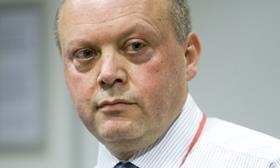- Joint Walsall/Royal Wolverhampton chiefs address “poor behaviour”, Babylon and mergers
- Leaders claim “quality suffers” when organisations are put under intense financial scrutiny
- They say they have appointed 300 nurses and 30 medical consultants
An acute trust was forced to try to balance its books, while operating with too few staff and being unable to reassure itself on quality due to a ‘non-existent’ governance system, its current leaders have claimed – as they warned that when organisations are put under financial pressure ‘quality suffers’.
That’s the reflection of David Loughton and Steve Field, who were named substantive chief executive officer and chair of Walsall Healthcare FT earlier this year, alongside holding the same roles at Royal Wolverhampton Trust.
Their arrival at Walsall in early 2021 as interim leaders was tumultuous, as the long-serving health chiefs found themselves at the centre of a “poor behaviour” investigation.
In February an NHS England investigation found Mr Loughton “behaved poorly” while Professor Field was “complicit”. Reviewers were told the CEO “called Walsall non-executive directors useless” and that Professor Field had said he was “ashamed to call himself chair”.
Despite this, NHSE said there had been “improvements” and supported the pair staying in Walsall, while both leaders apologised and said they were “motivated by patient safety”.
Now, in an exclusive interview with HSJ, Mr Loughton – who has been chief of RWT since 2004, and Professor Field, a GP and former chief inspector at the Care Quality Commission – have reflected on the trust they took over, what has changed, and the sudden axing of a 10-year deal with Babylon this summer.
‘Money became king’
Mr Loughton, who was appointed interim CEO of Walsall in April 2021, a month after Professor Field joined, said that when organisations are put in special measures and come under financial scrutiny, “it is quality that suffers”.
Walsall was placed in special measures for quality in February 2016 and only left them in July 2019 under the leadership of then CEO Richard Beeken. However, it remained in “enhanced financial oversight” led by NHSE/I regional teams for a few more years, after reporting sizable deficits. Walsall clinical commissioning group was also placed in special financial measures in 2016.
“If I was being critical of some of the things that have been difficult at Walsall, I can track it back to when Walsall was put into special measures, and money became king,” Mr Loughton told HSJ.

“You can see it in other parts of the country, it’s not just here. I remember talking to CQC’s chief inspector of hospitals, and saying ‘go and have a look at all the places that have been in special financial measures, because it’s the quality that suffers’.”
Mr Loughton has previously taken notable financial risks, including spending £12m of capital RWT did not have approval for to build a new 65-bed ward at the start of covid.
The CEO says he feels quality at Walsall is improving, with good initial feedback from inspectors and staff, whose morale he says has been boosted with new nurse and medical leadership.
Some 300 nurses have been recruited in a bid to reduce reliance on agency – Mr Loughton says his other organisation, RWT, has not used agency nurses since 2005.
A new group director of nursing leads the workforce across both trusts, while a new medical director does the same, leading 30 new consultants.
It is unclear what the leaders’ change of approach, and major recruitment drives, will mean for Walsall’s finances, but as of August the trust’s deficit was £2.5m, which was £4.6m below plan. Reasons included increased temporary medical workforce and shortfalls in savings/efficiency delivery.
RWT has generally balanced its books more often than most trusts, under Mr Loughton.
Addressing some of the allegations that faced the pair when they joined, Professor Field said “some really difficult decisions needed to be made” – some were human resource issues, others financial.
He said a backlog of serious incident investigation reports had been found and declining morale had been detected through staff surveys and CQC feedback.
He added: “The fundamental thing was [Walsall] was trying to manage their books on too few staff, but also the governance system was virtually non-existent… therefore the board couldn’t assure itself on quality, because it didn’t have the information and data to actually say what was good, and what was not good.”
Walsall came out of special measures in 2019 following improvements to maternity and emergency medicine, with care rated “outstanding”, although it remains in the second lowest category of “requires improvement” overall.
Merger would ‘distract and disrupt’
Mr Loughton and Professor Field’s Walsall appointments came after NHSE wrote a letter to the four acute trusts in Black Country integrated care system – Dudley Group, Sandwell and West Birmingham Trust, RWT and Walsall – in 2020, saying they must “rapidly agree on a hospital group model” by 2021-22.
Professor Field admits their arrival, and feelings that came with it – as he puts it “that initial anxiety and being scared of change” – meant that “unfortunately we have had to lose people, those that have chosen to move on, but we’ve got a really good group of diverse non-executives now”.
Around 18 months down the line, the leaders believe it is still not the right time to merge trusts altogether.
Professor Field said: “There is no reason to merge now, it would be a distraction. Relationships with both councils are superb, why would you want to disrupt that? For me, it’s about consolidation of the board, when finance is still hard. This is genuinely about Walsall growing, it’s not about Wolverhampton telling them what to do.”

Mr Loughton said the team had been able to support Walsall to lead some clinical areas at RWT, including dermatology.
“Walsall has also got one of the best ambulance turnaround times in the country and that’s improving,” he added. “It doesn’t have anywhere near the level of delayed transfers of care that most hospitals have, partly because of strong relationships between the council and NHS.”
The Walsall Together Partnership of health, social, housing, and community organisations was one of the earliest integrated care partnerships established back in 2016.
Mr Loughton said in the “force of time”, the current model of two separate boards may change – recently, the Black Country acute provider collaborative has proposed a move beyond the current North/South model , with the possibility of a single chair across all four of its trusts.
But he said “right now, [merging] is not that important”. He added: “Improvements have not been made because of the board but by bringing two groups of people together from both organisations.”
Babylon ‘couldn’t make any money’
Another high-profile move – this time for RWT – happened in August when digital health giant Babylon announced the end of a 10-year deal which had promised to provide an “Ask A&E” service. Nearby University Hospitals Birmingham ended its deal around the same time.
Mr Loughton said it was very simple: “They couldn’t make money out of it, it was a mutual agreement that they walked away, and they compensated us.”
There were no patient safety implications, he added, and the trust did not lose any money. Professor Field admitted that sometimes, “innovation doesn’t work”.
One joint piece of work across Walsall and Wolverhampton is its ‘hospital at home’ service, where six virtual wards are currently full of people with delayed transfers of care.
Mr Loughton praised Amanda Pritchard’s “honest” recent comments about winter.
“I dread to think where I’d be if I didn’t have 150 patients a day in hospital at home,” he added.
“Quite honestly, last winter never finished, it just carried on … I am concerned about how the NHS gets through this next period.”
He said his staff are more frightened now about mortgages, petrol, and cost of living than they were before the first waves of covid – and the trusts now offer £1.50 hot meals, food banks, and loan schemes.
The pair say their priority now is care quality, particularly in cancer and heart disease. A new diagnostic hub is due to open at Cannock Chase soon that will serve both trusts using some of the newly recruited consultants.
Professor Field added: “It’s all about efficiency, recruiting the best staff, and ensuring we get as many people through high quality-care as possible.”
Source
Exclusive interview
Source Date
November 2022


























6 Readers' comments